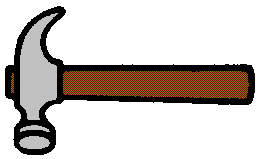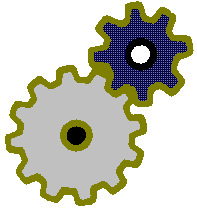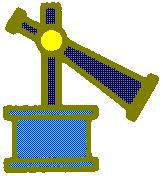Webelos Scout Activity Badges
|
CRAFTSMAN, ENGINEER, HANDYMAN, SCIENTIST

CRAFTSMAN
Do These:
- Explain how to safely handle the tools that you will use for this activity badge.
- With adult supervision and using hand tools, construct two different
wooden objects you and your Webelos den leader agree on, such as the
items listed below. Use a coping saw or jigsaw for these projects. Put
them together with glue, nails, or screws. Paint or stain them.
Book rack
Napkin holder Shelf Animal cutouts Bulletin board Garden tool rack Weather vane Lid holder Tie rack Mailbox Letter holder Birdhouse Notepad holder Desk nameplate Toolbox Letter, Bill. and Pencil holder Towel rack Bread box Recipe holder Key rack Lamp stand Measuring cup rack Kitchen knife rack Measuring spoon rack Kitchen utensil rack
- Make a display stand, or box to be used to display a model or an award. Or make a frame for a photo or painting. Use suitable material.
- Make four useful items using materials other than wood that you and your Webelos den leader agree on, such as clay, plastic, leather, metal, paper, rubber, or rope. These should be challenging items and must involve several operations.

ENGINEER
Do Five of These:
- List 10 different things engineers do.
- Visit a construction job. Look at a set of plans. Tell your Webelos den leader about these. (Get permission before you visit.)
- Visit a civil engineer to understand how to measure the length of a property line. Explain how property lines are determined.
- Tell about how electricity is generated and then gets to your home.
- Construct a simple working electrical circuit using a flashlight battery, a switch, and a light.
- Make drawings of three kinds of bridges and explain their differences. Construct a model bridge of your choice.
- Make a block and tackle and show how it works.
- Build a catapult and show how it works.
- Draw a floor plan of your house. Include doors, windows, and stairways.
- Explain how engineers use computers.

HANDYMAN
Do Six of These:
- With adult supervision, wash a car.
- Help an adult change a tire on a car.
- With adult supervision, replace a bulb in the taillight, turn signal, or parking light or replace a headlight on a car.
- With adult supervision, show how to check the oil level and tire pressure on a car.
- Make a repair to a bicycle, such as tightening the chain, fixing a flat tire, or adjusting the seat or handlebars.
- Properly lubricate the chain and crank on a bicycle.
- Properly inflate the tires on a bicycle.
- Replace a light bulb in a fixture or lamp.
- With adult supervision, arrange a storage area for household cleaners and other dangerous materials where small children cannot get them.
- Build a sawhorse or stool to be used around your home.
- Help take care of the lawn.
- Arrange a storage area for hand tools or lawn and garden tools.
- Clean and properly store hand tools or lawn and garden tools in their storage area.
- Mark hand tools or lawn and garden tools for identification.

SCIENTIST
Do These:
- Read Bernoulli's Principle. Show how it works.
- Read Pascal's Law. Tell about some inventions that use Pascal's law.
- Read Newton's first law of motion. Show in three different ways how inertia works.
And Do Six of These:
- Show the effects of atmospheric pressure.
- Show the effects of air pressure.
- Show the effects of water pressure. This may be combined with atmospheric pressure or with air pressure.
- Build and launch a model rocket with adult supervision. (NOTE: You must be at least 10 years old to work with a model rocket kit sold in hobby stores.)
- Explain what causes fog. Show how this works.
- Explain how crystals are formed. Make some.
- Explain how you use your center of gravity to keep your balance. Show three different balancing tricks.
- Show in three different ways how your eyes work together.
- Show what is meant by an optical illusion.
